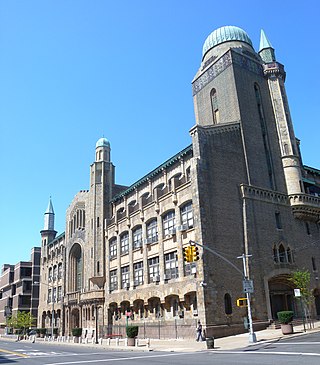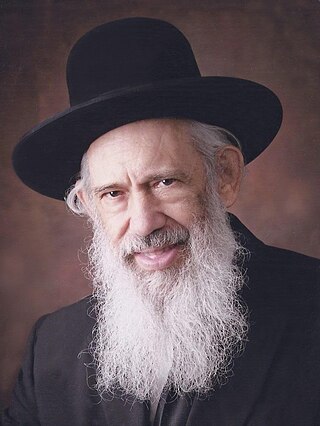
Ner Israel Rabbinical College, also known as NIRC and Ner Yisroel, is a Haredi yeshiva in Pikesville, Maryland. It was founded in 1933 by Rabbi Yaakov Yitzchok Ruderman, a disciple of Rabbi Nosson Tzvi Finkel, dean of the Slabodka yeshiva in Lithuania. Rabbi Aharon Feldman, a disciple of Rabbi Ruderman and a member of the Moetzes Gedolei HaTorah of America, became its head in 2001.

The Orthodox Union is one of the largest Orthodox Jewish organizations in the United States. Founded in 1898, the OU supports a network of synagogues, youth programs, Jewish and Religious Zionist advocacy programs, programs for the disabled, localized religious study programs, and international units with locations in Israel and formerly in Ukraine. The OU maintains a kosher certification service, whose circled-U hechsher symbol, U+24CAⓊCIRCLED LATIN CAPITAL LETTER U, is found on the labels of many kosher commercial and consumer food products.

Bernard (Dov) Revel was an Orthodox rabbi and scholar. He served as the first President of Yeshiva College from 1915 until his death in 1940. The Bernard Revel Graduate School of Jewish Studies at Yeshiva University, as well as the former Yeshiva Dov Revel of Forest Hills, are named after him.
Hershel Reichman is an Orthodox rabbi and rosh yeshiva of Rabbi Isaac Elchanan Theological Seminary, an affiliate of Yeshiva University.
The Union of Orthodox Rabbis of the United States and Canada (UOR), often called by its Hebrew name, Agudath Harabonim or (in Ashkenazi Hebrew) Agudas Harabonim ("union of rabbis"), was established in 1901 in the United States and is the oldest organization of Orthodox rabbis in the United States. It had been for many years the principal group for such rabbis, though in recent years it has lost much of its former membership and influence.

The Marsha Stern Talmudical Academy, also known as Yeshiva University High School for Boys (YUHSB) and Manhattan Talmudical Academy, is a Modern Orthodox Jewish day school, yeshiva, and boys' prep school of Yeshiva University. It is located in the Washington Heights neighborhood in New York City. It is the brother school to the Samuel H. Wang Yeshiva University High School for Girls.
Rabbi Isaac Elchanan Theological Seminary is the rabbinical seminary of Yeshiva University (YU). It is located along Amsterdam Avenue in the Washington Heights neighborhood of Manhattan, New York City.

Agudath Israel Etz Ahayem, transliterated from Hebrew to mean the Congregation of Israel Tree of Life, is a Conservative Jewish synagogue located at 3525 Cloverdale Road in Montgomery, Alabama, in the United States.

Congregation Kehilath Jeshurun is a Modern Orthodox Jewish synagogue at 126 East 85th Street on the Upper East Side of Manhattan in New York City, New York, United States. The synagogue was founded in 1872. The synagogue is closely affiliated with the Ramaz School. The lower school is co-located in an adjacent building and is across the street from the middle school.
Herbert S. Goldstein was a prominent American rabbi and Jewish leader. He was the only person to have been elected president of the Union of Orthodox Jewish Congregations of America, the Rabbinical Council of America, and the Synagogue Council of America. Globally, he fought for the survival and transplantation of European Jewry as an activist in the Vaad Hatzalah and the Agudath Israel.

Neve Yerushalayim is the oldest and largest college for Jewish women in the world. Founded in 1970 to educate baalot teshuva in the why and how of living an Orthodox Jewish life, Neve has approximately 35,000 alumni. Its campus in the Har Nof neighborhood of Jerusalem is also home to 11 schools and seminaries for post-high school, undergraduate, and graduate students from religious backgrounds.
Etz Chaim Yeshiva was an orthodox yeshiva located on Jaffa Road close to the Mahane Yehuda Market in downtown Jerusalem.

Shmuel Yaakov Weinberg, known as Yaakov Weinberg was an Orthodox Jewish rabbi, Talmudist, and rosh yeshiva (dean) of Ner Israel Rabbinical College in Baltimore, Maryland, one of the major American non-Hasidic yeshivas. Weinberg was also a rabbinical advisor and board member in Haredi and Orthodox institutions such as Torah Umesorah, Agudath Israel of America and the Association for Jewish Outreach Programs.

Eliyahu Yosef She'ar-Yashuv Cohen was the Ashkenazi Chief Rabbi of Haifa, Israel and the President of its rabbinical courts (1975–2011).
Etz Chaim Yeshiva was a "Lithuanian" Orthodox yeshiva, now advanced kollel, in Golders Green, London, England. It operated as a yeshiva from the early 1900s through the 1990s, when it repositioned to function as the latter. It has several prominent alumni including Commonwealth Chief Rabbis Immanuel Jakobovits and Jonathan Sacks.

Joseph Hyman Lookstein was a Russian-born American rabbi who served as spiritual leader of Congregation Kehilath Jeshurun on the Upper East Side of Manhattan and was a leader in Orthodox Judaism, including his service as president of the Rabbinical Council of America and of the cross-denominational Synagogue Council of America and New York Board of Rabbis. He was President of Bar-Ilan University from 1957 to 1967.

Moses Sebulun Margolies was a Russian-born American Orthodox who served as senior rabbi of Congregation Kehilath Jeshurun on the Upper East Side of the New York City borough of Manhattan. In its obituary, The New York Times described Margolies as the "dean of orthodox rabbis in North America," a "Zionist leader and Jewish educator."

Rabbi Bernard Louis Levinthal, the "Dean of U.S. Rabbis," built Philadelphia's first Eastern European Orthodox Jewish community from his arrival in the United States in 1891 until his death in 1952. Rabbi Levinthal helped found American Jewish Orthodox institutions including Yeshiva University in 1896, the Orthodox Union in 1898, Mizrachi in 1902, and the American Agudas Harabbanim. His grave is in Congregation Mikveh Israel's 55th Street Cemetery in West Philadelphia.

Tzvi Kushelevsky is an Israeli Orthodox rabbi and Talmudic scholar. He is the founder and the rosh yeshivah of Heichal HaTorah BeZion, a yeshiva in Jerusalem, Israel.















